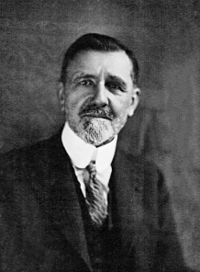Cambrian crustacean’s unusual vision system described
ID Foundations, 11: Borel’s Infinite Monkeys analysis and the significance of the log reduced Chi metric, Chi_500 = I*S – 500
(Series)

Emile Borel (1871 – 1956) was a distinguished French Mathematician who — a son of a Minister — came from France’s Protestant minority, and he was a founder of measure theory in mathematics. He was also a significant contributor to modern probability theory, and so Knobloch observed of his approach, that:
>>Borel published more than fifty papers between 1905 and 1950 on the calculus of probability. They were mainly motivated or influenced by Poincaré, Bertrand, Reichenbach, and Keynes. However, he took for the most part an opposed view because of his realistic attitude toward mathematics. He stressed the important and practical value of probability theory. He emphasized the applications to the different sociological, biological, physical, and mathematical sciences. He preferred to elucidate these applications instead of looking for an axiomatization of probability theory. Its essential peculiarities were for him unpredictability, indeterminism, and discontinuity. Nevertheless, he was interested in a clarification of the probability concept. [Emile Borel as a probabilist, in The probabilist revolution Vol 1 (Cambridge Mass., 1987), 215-233. Cited, Mac Tutor History of Mathematics Archive, Borel Biography.]>>
Among other things, he is credited as the worker who introduced a serious mathematical analysis of the so-called Infinite Monkeys theorem (just a moment).
So, it is unsurprising that Abel, in his recent universal plausibility metric paper, observed that:
Emile Borel’s limit of cosmic probabilistic resources [c. 1913?] was only 1050 [[23] (pg. 28-30)]. Borel based this probability bound in part on the product of the number of observable stars (109) times the number of possible human observations that could be made on those stars (1020).
This of course, is now a bit expanded, since the breakthroughs in astronomy occasioned by the Mt Wilson 100-inch telescope under Hubble in the 1920’s. However, it does underscore how centrally important the issue of available resources is, to render a given — logically and physically strictly possible but utterly improbable — potential chance- based event reasonably observable.
Note to Gil Dodgen: Dawkins feels ENTITLED to blame his bad temper and poor taste on an obituary …
He said it: Why journalist David Warren does not trust statistics
Why is Richard Dawkins Grumpy?
Because the News item concerning Lynn Margulis will quickly scroll away on this forum, I offer the following. Lynn Margulis is dead. Richard Dawkins (on whether she was a one-hit wonder and her obituary): Yes, that is exactly what she was. She was right about one big thing – and not many people can say that, so she deserves credit for it. But she more than used that credit up being wrong, in a big way, about almost everything else. She bizarrely saw herself as anti-Darwinian, and bad-mouthed the entire neo-Darwinian synthesis and just about everybody associated with it. She once said, in my presence, “John Maynard Smith doesn’t understand evolution”. Fortunately she was not taken seriously enough for her Read More ›
Scientists should be intolerant, revisited
Darwinists on Margulis: Speak nothing but ill of the newly dead
Evolutionary psychologists: Might a taller opponent defeat Obama?
New find re deep sea fishing blows previous histories “out of the water”
Dave Coppedge: The only forbidden assumption is that evidence for fine-tuning is not an illusion
Serious distortions of the history of humanity, courtesy ape studies
New butterfly species – that look just like other species – identified by DNA
Mark Pallen is Half Right (And All Wrong)
Evolutionist Mark Pallen asks “Is it possible to be a rationalist (a believer in the laws of logic) but not believe in evolution?” Pallen’s answers is “no,” which seems almost correct. Evolution arose from religious rationalism and today dominates rationalist thought. Can you find a rationalist who does not believe in evolution? Read more